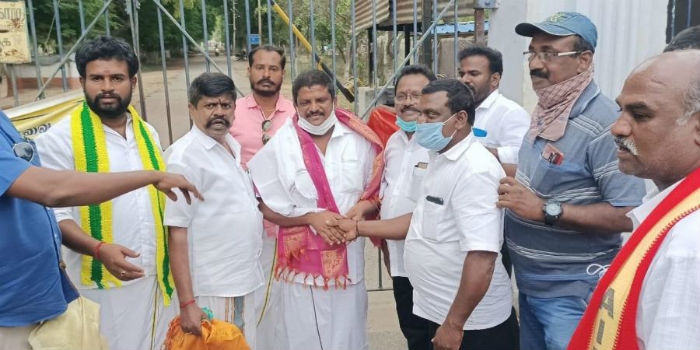The caste-honor killing of Shankar, which took place near Udumalpet bus stand, Tiruppur district, on March 12, 2016, shook everyone who believed in humanity. If the murder was not captured on CCTV installed in the locality, the case would’ve been closed with the police terming it as a suspected death, and the courts saying Shankar hacked himself to death. But the CCTV footage released by some TV channels proved to be an indestructible source. People who hitherto knew caste-honor killings only through news, were witness to the horrific face of casteism.
Strong witnesses meant, the Tamil Nadu police and the State had to prosecute the case honestly. Nine of the 11 people connected with the murder were detained under the Goondas Act and the trial was held at the Special Court of the Tirupur Principal District and Sessions Judge Court.
The verdict of this case was delivered on December 13, 2017. Eight were found guilty and Kowsalya's father Chinnasamy was awarded the double death penalty with 10 years for criminal conspiracy. The court also ordered a compensation of Rs 11.95 lakh to Kausalya and Shankar's family. Accused-7 Kalai Thamilvanan and Accused-8 Madan alias Michael received death sentence, Accused-9 Stephen Dhanraj got life imprisonment and Accused-11 Manikandan was awarded a 5 years imprisonment. Kowsalya's mother Annalakshmi, her maternal Uncle Pandidurai and another assailant Prasanna were acquitted from the case.

(Castiest people welcoming Chinnasamy at prison gate)
The case was referred to the Madras High Court seeking confirmation of the death sentences. Also, on February 26, 2018, an appeal was filed on behalf of the death convicts. The judges delivered their verdict on June 22, 2020 and set aside the death sentence of Kowsalya's father Chinnasamy, commuted the death sentence of five convicts to life imprisonment and acquitted three others including Kowsalya's mother and well-known marijuana seller Annalakshmi. Two others of the gang were acquitted from all charges too.
The High Court concluded that Chinnasamy's involvement in the murder conspiracy was not sufficiently proved by the prosecution and ordered his release. Then, one wonder, who ordered the five assailants to murder Shankar and why Chinnasamy and his wife Annalakshmi made telephonic calls to the five assailants, prior to the murder.
As far as the courts are concerned, they see only the evidence in front of them. Beyond that, they will never be concerned about the impact of crimes like this on the society, and that it is pushed to the primitive era. Judges of the Indian judiciary seem to snap themselves from real world and act as Gods from the heavens.
Who were the assailants to Shankar and was there any dispute between them? If yes, what was that and if not, why should they have murdered him? And why did they try to kill Kowsalya too? Who were the assailants to her? What was the motive? Was it committed for money, enmity or to preserve caste ‘honour’? If for money, who paid the assailants? And if it was for the sake of caste, have all the convicts been punished under the SC/ST Prevention of Atrocities Act? If not, on what basis does the court think the murder was committed?
The High Court’s verdict raises many such questions. But the court has no obligation to answer any of them. Court orders never seem to understand the collective interests of the public. While that may seem right per se, in a society that’s full of caste and class conflicts, assessing a violent act unleashed from two different psychologies, on the same plate is a blatant violation of ethics. From past judgments of Indian courts, one can clearly say if we could have received a judgment like this, if Dalits were the assailants and the Shudra caste at the receiving end.
Sankar's assassination was an expression of blatant casteism. The five assailants and Chinnasamy belong to the same caste. But compared to Chinnasamy, all the others hail from a very poor background. If wished, Chinnasamy would have committed the murder himself. But people like him would never want to leave behind the luxuries of life and go to jail. Rather, they instigate the illiterate and impoverished youth belonging to their caste on caste lines, lure them with money and achieve their goals. All the crimes committed against dalits have been carried out in almost the same fashion. From Dharmapuri to Ponparappi riots, we have enough evidences.
Chinnasamy and his wife Annalakshmi, the brains behind this murder have been acquitted from all the charges of the crime. But all the five men who committed the murder on behalf of them are serving their sentences. If caste is the sole reason for Chinnasamy to kill Shankar, for these men, class remains one of the reasons. These class contradictions within the same caste form the root of caste politics.
The reality is, though all votes carry equal value in Indian society, not all citizens carry equal value. It’s this reality that proves itself in courts, police stations, prisons and everywhere. In a society of class differences, democracy and justice always echo the psychology of the oppressing class.
The current verdict of the court teaches those who fight for justice the importance of ‘dying with evidence’, and caste killers the importance of ‘how to commit a murder without evidence’. This may help the parties concerned in the coming years. Because Indian courts rely on evidences, not conscience.
- S.Gorky
(This article was originally published in keetru.com on 25-Jun-2020)

